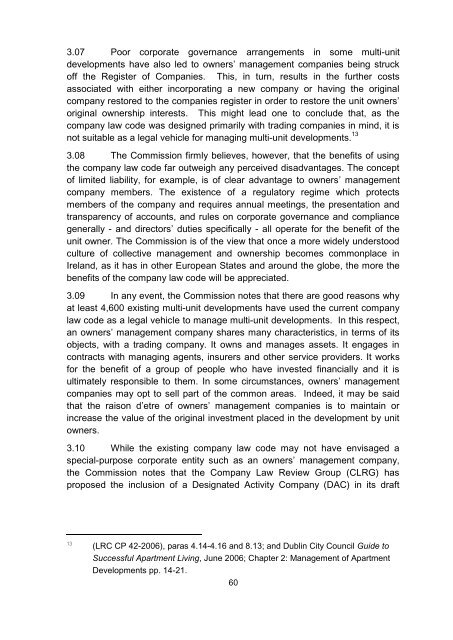Report on Multi-Unit Developments - Law Reform Commission
Report on Multi-Unit Developments - Law Reform Commission
Report on Multi-Unit Developments - Law Reform Commission
You also want an ePaper? Increase the reach of your titles
YUMPU automatically turns print PDFs into web optimized ePapers that Google loves.
3.07 Poor corporate governance arrangements in some multi-unit<br />
developments have also led to owners‘ management companies being struck<br />
off the Register of Companies. This, in turn, results in the further costs<br />
associated with either incorporating a new company or having the original<br />
company restored to the companies register in order to restore the unit owners‘<br />
original ownership interests. This might lead <strong>on</strong>e to c<strong>on</strong>clude that, as the<br />
company law code was designed primarily with trading companies in mind, it is<br />
not suitable as a legal vehicle for managing multi-unit developments. 13<br />
3.08 The Commissi<strong>on</strong> firmly believes, however, that the benefits of using<br />
the company law code far outweigh any perceived disadvantages. The c<strong>on</strong>cept<br />
of limited liability, for example, is of clear advantage to owners‘ management<br />
company members. The existence of a regulatory regime which protects<br />
members of the company and requires annual meetings, the presentati<strong>on</strong> and<br />
transparency of accounts, and rules <strong>on</strong> corporate governance and compliance<br />
generally - and directors‘ duties specifically - all operate for the benefit of the<br />
unit owner. The Commissi<strong>on</strong> is of the view that <strong>on</strong>ce a more widely understood<br />
culture of collective management and ownership becomes comm<strong>on</strong>place in<br />
Ireland, as it has in other European States and around the globe, the more the<br />
benefits of the company law code will be appreciated.<br />
3.09 In any event, the Commissi<strong>on</strong> notes that there are good reas<strong>on</strong>s why<br />
at least 4,600 existing multi-unit developments have used the current company<br />
law code as a legal vehicle to manage multi-unit developments. In this respect,<br />
an owners‘ management company shares many characteristics, in terms of its<br />
objects, with a trading company. It owns and manages assets. It engages in<br />
c<strong>on</strong>tracts with managing agents, insurers and other service providers. It works<br />
for the benefit of a group of people who have invested financially and it is<br />
ultimately resp<strong>on</strong>sible to them. In some circumstances, owners‘ management<br />
companies may opt to sell part of the comm<strong>on</strong> areas. Indeed, it may be said<br />
that the rais<strong>on</strong> d‘etre of owners‘ management companies is to maintain or<br />
increase the value of the original investment placed in the development by unit<br />
owners.<br />
3.10 While the existing company law code may not have envisaged a<br />
special-purpose corporate entity such as an owners‘ management company,<br />
the Commissi<strong>on</strong> notes that the Company <strong>Law</strong> Review Group (CLRG) has<br />
proposed the inclusi<strong>on</strong> of a Designated Activity Company (DAC) in its draft<br />
13<br />
(LRC CP 42-2006), paras 4.14-4.16 and 8.13; and Dublin City Council Guide to<br />
Successful Apartment Living, June 2006; Chapter 2: Management of Apartment<br />
<strong>Developments</strong> pp. 14-21.<br />
60

















